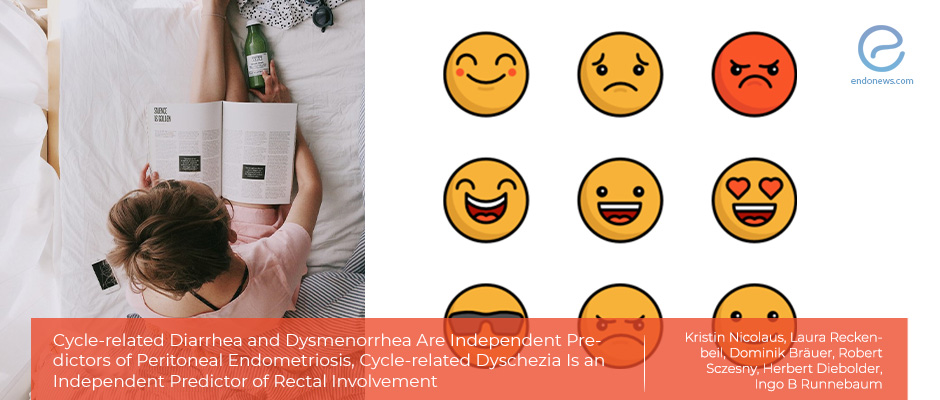Cycle-related gastrointestinal complaints in reproductive age young women
Mar 18, 2020
Cycle-related diarrhea and dysmenorrhea in young women of reproductive age may indicate endometriosis.
Key Points
Highlights:
- Rectal endometriosis risk is increased by dyschezia.
Importance:
- This study draws attention to the delay in the diagnosis of young endometriosis patients with gastrointestinal symptoms
- The importance of taking a medical history and asking questions about the patient's symptoms is crucial.
What’s done here?:
- A retrospective analysis was conducted on 266 patients who presented to the Clinic and Polyclinic for Gynecology and Reproductive Medicine at Jena University Hospital to decide for surgery for endometriosis.
- Patients were also asked to complete a questionnaire regarding their medical history and the symptoms.
Key Results:
- The mean age of the participants was 34.26 years.
- Infertility was reported by 41.8% of the cases.
- More than 10 years passed between experiencing the first symptoms to obtaining the correct diagnosis in approximately 40% of the participants.
- The use of diagnostic laparoscopy, especially if used in combination with the targeted taking of the patientʼs history and careful questioning about symptoms would decrease the delay in obtaining the correct diagnosis.
Limitations:
- To differentiate between endometriosis lesions and endometriosis-related adhesions was not possible due to the retrospective nature of the study.
Lay Summary
An analysis of 1-year data on 266 patients who presented to the Clinic and Polyclinic for Gynecology and Reproductive Medicine at Jena University Hospital to undergo surgery for endometriosis and its symptoms was performed by Nicolaous K. et al., a team of researchers from Germany.
The team evaluated the type and duration of endometriosis-related symptoms and identified predictors for patterns of involvement depending on symptoms.
Also, a questionnaire including parameters such as type and duration of symptoms before surgery, number of doctors consulted until the diagnosis was made, the use of painkillers, how often patients were unable to work because of symptoms, were distributed to the patients.
Results of the study, published early this month in the journal Geburtshilfe Frauenheilkd, not only reveal more than 10 year delay in the correct diagnosis, but also the increased risk of peritoneal endometriosis in patients with cycle-related gastrointestinal complaints and increased risk of rectal endometriosis in patients with cycle-related dyschezia.
Pelvic pain was the most commonly reported symptom (91.8%). Infertile patients constituted 41.8 % of patients. In more than 1⁄3 patients with infertility and patients without infertility, more than 10 years passed between the initial symptoms and the final diagnosis.
The team recommended that typical endometriosis symptoms should be asked to the patient and unspecific cycle-related gastrointestinal complaints in young women of reproductive age which can be indications for endometriosis to decrease the delay in the diagnosis. ¨
In addition, diagnostic laparoscopy may be offered to reduce the delay in obtaining the correct diagnosis¨, the authors added.
Research Source: https://pubmed.ncbi.nlm.nih.gov/32139920
endometriosis bowel endometriosis rectovaginal endometriosis endometriosis diarrhea dysmenorrhea dyschezia diarrhea spoonie gastrointestinal symptoms cycle-related stage 3 endometriosis

